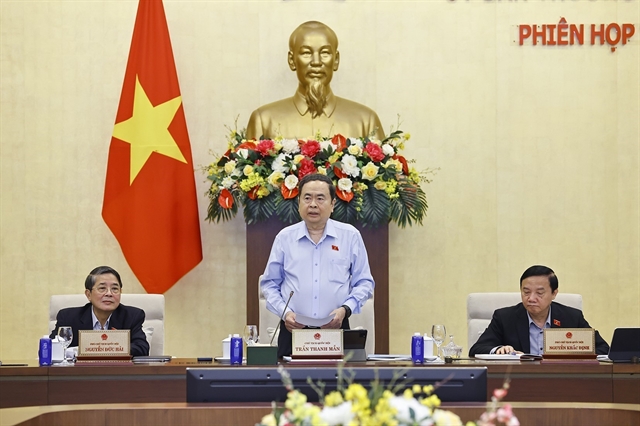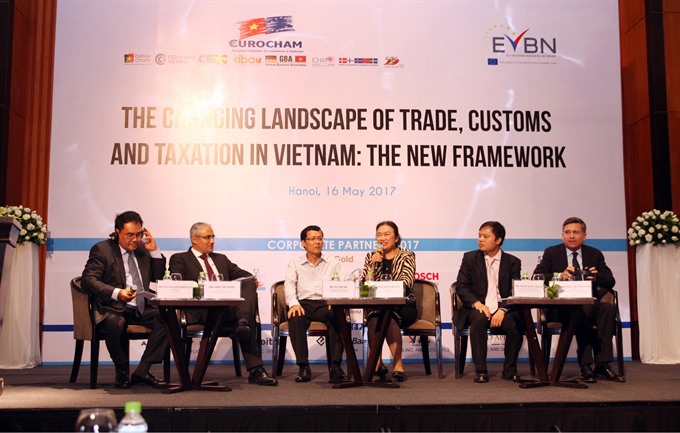 Economy
Economy

How to improve the business environment in Việt Nam with respect to customs, trade facilitation measures and the tax regime by capitalising on the opportunities thrown up by the EU -- Việt Nam Free Trade Agreement were discussed at a European Chamber of Commerce in Việt Nam (EuroCham) meeting in Hà Nội on Tuesday.
 |
| Experts at the conference. VNS Photo |
HÀ NỘI — How to improve the business environment in Việt Nam with respect to customs, trade facilitation measures and the tax regime by capitalising on the opportunities thrown up by the EU -- Việt Nam Free Trade Agreement were discussed at a European Chamber of Commerce in Việt Nam (EuroCham) meeting in Hà Nội on Tuesday.
The meeting, titled “The changing landscape of trade, customs and taxation in Việt Nam,” was attended by hundred of government officials, experts and business executives who expressed concern about customs audit and penalties for administrative inconsistencies in tax declarations.
Phạm Ngọc Thạch of the Việt Nam Chamber of Commerce and Industry (VCCI) said while companies were increasingly happy with the improvements in customs and administration, they could not keep abreast of the many amendments to regulations, resulting in delays in filing customs declarations.
Thạch quoted a 2016 VCCI report on administrative and customs procedures that said over 20 per cent of companies faced difficulties with procedures related to tax exemptions and refunds.
Business executives warned that setting the rules to impose taxes and apply penalties to administrative mistakes would worsen the investment environment in Việt Nam.
Nguyễn Thị Thu Cúc, chairwoman of the Tax Consultants Association, said the Government was making efforts to improve administrative and taxation procedures.
To attract more investors, it needed to have a transparent legal system, and the investment environment should be better and the cost of entering the market lower, she said.
Delegates referred to challenges faced by businesses with respect to customs-related legal documents: For instance, customs authorities’ ability to reject the value declared by a business or their competence in handling businesses’ administrative errors in declarations.
Many businesses have been audited by the customs authorities and had their customs declarations rejected and penalties slapped for administrative errors found in declaration from several years ago.
Shivam Misra, co-chairman of EuroCham’s Wine & Spirits Sector Committee, said: “The European business community is very concerned about the customs framework and its manner of execution, especially if administrative errors are used to open up valuation methods or impose heavy non-merit based penalties. This undermines the confidence that businesses have in Việt Nam and its investment environment. Companies might be forced to reconsider investing and also downsize operations if the environment is not conducive to business operations. We want to co-operate with and support the Government, but it becomes difficult if businesses are not given a fair chance to conduct their operations smoothly.”
Thomas McClelland, chairman of the EuroCham Tax and Transfer Pricing Sector Committee, said: “Việt Nam’s tax framework is increasingly focusing on substance over form as indicated in recently issued tax regulations, for example the recent Decree 20 on transfer pricing.
“However, in practice, our members have experienced that administrative breaches seem to be increasingly the focus of many tax and customs audits.
“The nature of the administrative breaches, such as inconsistencies in a customs declaration or what is considered a failure to follow a non-tax procedure, is simply an administrative mistake which should not be used as the legal basis for the customs or tax authorities to apply tax arrears and penalties or deny a tax refund.
“We see more reasonable and positive treatment when the matter is considered at the higher level such as Ministry of Finance. However, by this time taxpayers have often spent a significant amount of time to try and resolve the issue.” VNS




